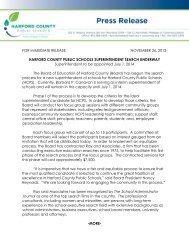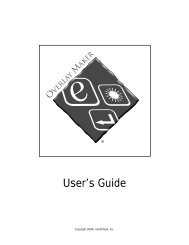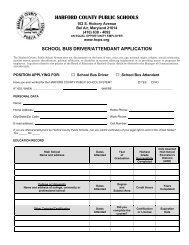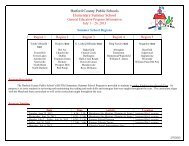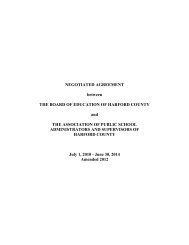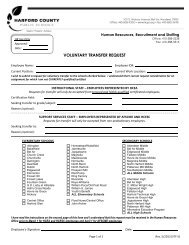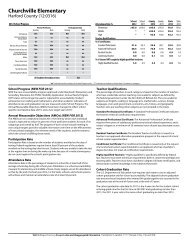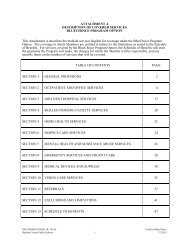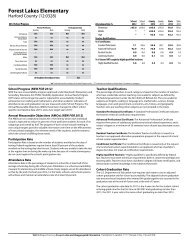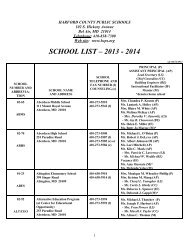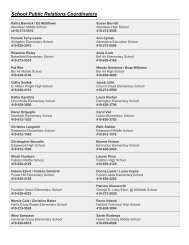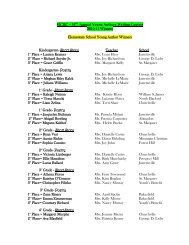Parent Handbook - Harford County Public Schools
Parent Handbook - Harford County Public Schools
Parent Handbook - Harford County Public Schools
Create successful ePaper yourself
Turn your PDF publications into a flip-book with our unique Google optimized e-Paper software.
• All medication must be accompanied by a written health care provider’s order. These<br />
instructions must contain: the student’s name, name of the medication, the route of<br />
administration, the exact dosage, time and circumstances of administration, length of time<br />
the medication is to be continued, reason for administration, health care provider’s<br />
name, time and frequency of administration and date of order. <strong>Parent</strong>s/guardians<br />
must also provide written authorization to administer medication to their child. For your<br />
convenience, a form for this purpose is available from the school nurse. No medication<br />
may be administered to a student without the required health care provider’s<br />
order and parent/guardian permission. Faxed medication orders are acceptable. In<br />
some circumstances orders written on health care provider’s letterhead or prescription<br />
pad is acceptable.<br />
• The parent/guardian should give the first dose of any new prescription or over the<br />
counter medication at home (except for emergency medication, e.g. Epi-Pen®).<br />
• Medication must be in its original prescription bottle, properly labeled by the pharmacy.<br />
Pharmacies can provide a second labeled bottle to accommodate medications that are<br />
given at school. Siblings may not share medication.<br />
• Discretionary medications are available for occasional use only to students who<br />
have a signed permission slip on file in the health suite. Acetaminophen, ibuprofen,<br />
diphenhydramine, antacid tablets and cough drops may be administered under the<br />
ordered protocols of the physician from the <strong>Harford</strong> <strong>County</strong> Health Department and at<br />
the discretion of the school nurse.<br />
• Over-the-counter medications that are required on a more than occasional basis must<br />
be accompanied by an order from an authorized health care provider and supplied and<br />
transported to the health suite by the parent/guardian.<br />
<strong>Parent</strong>s/guardians or their designee must bring the medication to the school personally.<br />
Students are not permitted to carry medication on school buses or the school<br />
grounds. Under extenuating circumstances there may be exceptions. This is for the safety of<br />
all students.<br />
• If the health care provider feels that your child must carry and self-administer either an<br />
inhaler or Epi-Pen®, please have the health care provider complete the “Permission for<br />
Students to Carry/Self Administer Medications” form, stating the medical necessity for<br />
carrying the medication. The parent/guardian must also sign the form. This completed<br />
form must be given to the school nurse. The school nurse will notify all appropriate<br />
personnel when such exceptions are granted, including bus drivers. A copy of this<br />
form will be retained in the student’s confidential health folder. The Contract for Self-<br />
Administration of Medication must also be completed. Back-up medications must be<br />
kept in the health suite.<br />
• No medication will be stored over the summer. The parent/guardian must pick up<br />
all medication by the end of the school day on the last day of school. Any remaining<br />
medication not picked up by a parent/guardian will be destroyed. No medication will be<br />
sent home with a student.<br />
• A new health care provider’s order and parent/guardian permission form is required for<br />
medications at the beginning of each new school year, and for any changes during the<br />
school year.<br />
• Students are permitted to carry cough drops, but must have written parent/guardian<br />
permission. No health care provider’s order is required.<br />
To ensure the safety of the student taking medications, as well as other students, the following apply:<br />
• All medications are kept in a locked cabinet in the health suite at all times.<br />
• Medication must be taken in the presence of the school nurse, principal, or designee.<br />
• Records are maintained documenting the medication taken, date, time, and the person who administered<br />
it. Immunization requirements can be found under Registering Your Child For School, page 17.<br />
Home And Hospital Instruction<br />
Home and hospital instruction is a teaching and learning temporary program when a child is unable to attend<br />
school because of illness, accident, or emotional impairment.<br />
FOR THE STUDENT . . .<br />
• Students will be given a minimum of six hours of instruction per week.<br />
• Books will be provided by the school.<br />
• At quarterly intervals, progress will be assessed and will become part of the school report card grade.<br />
FOR THE PARENT . . .<br />
• There is no charge for this service.<br />
• The service is provided for physically and/or emotionally impaired students.<br />
• A physician or psychiatrist/psychologist must verify that the child is unable to attend school.<br />
• Home teaching will begin at the time of verification of the need.<br />
FOR THE SCHOOL . . .<br />
• The school will be contacted by the home teacher immediately after being assigned.<br />
• The school coordinator of home teaching will gather the lessons, plans, books, etc., for the home teacher.<br />
• Just prior to the end of each marking period, the school will receive grades from the home teacher.<br />
• Home teaching grades will be averaged into the grades earned while the student was in school.<br />
FOR THE HOME TEACHER . . .<br />
• The home teacher will contact the school to make arrangements to pick up books and materials.<br />
• The home teacher will arrange with the student and her/his family a mutually agreed-upon schedule.<br />
• The home teacher will be responsible for submitting progress reports to the school.<br />
• The home teacher will notify the area Student Services Office and the school of the termination of the<br />
home teaching program.<br />
• The home teacher will return all books and materials to the school.<br />
Homework<br />
Properly planned homework assignments should relate directly to class work and extend learning beyond<br />
the classroom. Effective homework assignments teach students to become independent learners. While it is<br />
recognized that student achievement improves significantly when teachers regularly assign homework and<br />
students conscientiously complete assignments, homework has other important purposes. Homework provides<br />
the students valuable experiences in following directions, making judgments, raising additional questions for<br />
study, and developing responsibility and self-discipline.<br />
Additionally, homework is a means to communicate to parents regarding current class activities and topics of<br />
study.<br />
1. Appropriateness of Homework<br />
Homework should be appropriate to the age, ability, and independent level of students. Student<br />
characteristics including grade level, motivation, and study habits must be considered.<br />
2. Assignment Characteristics and Initial Classroom Factors<br />
Teachers should ensure that students understand the purpose of each homework assignment. The<br />
amount of homework, the skills to be reinforced, and completion deadlines influence student outcomes.<br />
12



